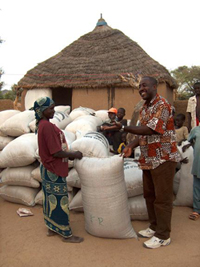Food prices around the world are at record highs, leading to tension and violence reminiscent of 2008, when high prices led to dozens of food rebellions.
“We are alarmed at the rising prices. If they continue to rise, the numbers of hungry people too will rise,” said Ruth Farrell, coordinator of the Presbyterian Hunger Program.
Meat and sugar prices are especially high. Rice and wheat prices are not as high as they were in 2008, but bad weather could cause a spike. Corn prices, which have risen sharply, are the exception due in part to U.S. policies supporting corn-based ethanol. The Environmental Protection Agency could reduce pressure on corn (and meat, as livestock is a major consumer of corn) prices by suspending the biofuel mandate.
“The United States and other donor nations must come through on their promises to increase funding for agriculture in Africa and other places where family farmers have been hurt by trade policies and neglect both by domestic governments and international development over the past decades,” Farrell said.
While leaders of multilateral institutions claim that the market can solve the problem, overseas and domestic networks related to the Presbyterian Church (U.S.A.) point to deeper flaws in global food and farming systems.

Haitian woman with part of her harvest. Photo: Presbyterian Hunger Program
The World Bank Group, a U.S.-based organization that helps developing nations reach their goals and alleviate poverty, asserts that market forces can ameliorate the process. In a Jan. op-ed in the Financial Times, President Robert Zoelick said the World Bank has created a “crisis window … and launched a rapid-response Food Security Fund, but we could also explore credit lines or loans with repayment suspension and extension during price shocks.”
But that strategy doesn’t address the root causes of hunger, said a PHP staffer.
“While the World Bank plan may reduce the extent and pain of the price shocks, most of it fails to address the underlying factors that perpetuate hunger and food price volatility,” said Andrew Kang Bartlett, PHP’s associate for national hunger concerns.
International partners who were consulted during the 12-month global food crisis demonstrated that market fixes would at best treat some of the symptoms.
Partners in Cameroon and Haiti described how the influx of imported cheap grain or emergency food aid had damaged local agriculture and set countries up for shortages and starvation. Partners from Brazil highlighted the danger of having a small number of private companies own the rights to genetic information and seeds.
In the wake of the 2008 food price crisis, economists blamed the spike in food prices on increased speculation in food, energy and metal commodity funds. In fact, some assert that excessive speculation in the commodities markets by very large hedge funds and investment banks helped create the global economic meltdown.
“For people in developing countries who may be using half to three-quarters of their income to feed themselves and their families, the volatility caused by speculation can be death sentence,” Kang Bartlett said.

A man harvests fruit from a palm oil tree. Photo by Andrew Kang Bartlett.
The United Nations’ food price index in December 2010 was higher than in June 2008, when riots erupted around the world. In July 2008, the PC(USA) passed a General Assembly action “On Mobilizing Presbyterians for a Significant Response to the Global Food Crisis.”
Presbyterians responded with a year of monthly 40-hour church-wide fasts, which focused on understanding and advocating for changes in the root causes of the crisis. The PC(USA) is committed to ending hunger through investing in smallholder farmers who produce food for their communities; advocacy for trade and development policies that strengthen local food economies; and living more sustainably.
Curriculum with prayers from around the world, biblical reflections and action ideas related to the global food crisis are available at the Food Crisis website.

